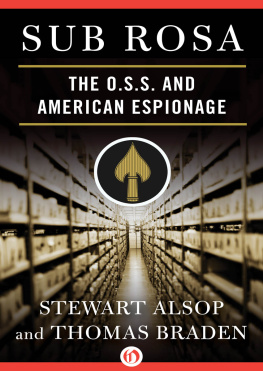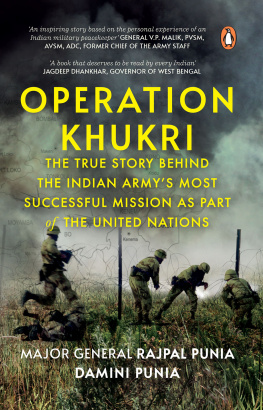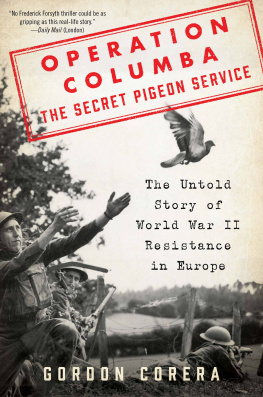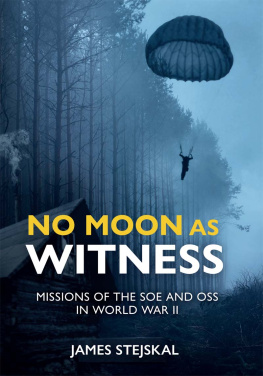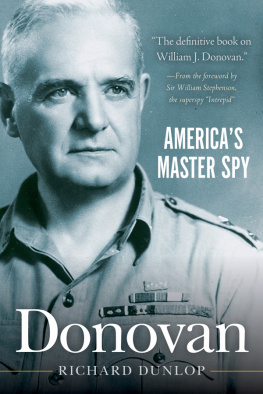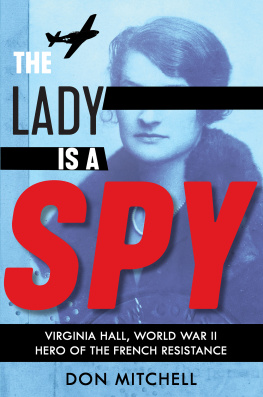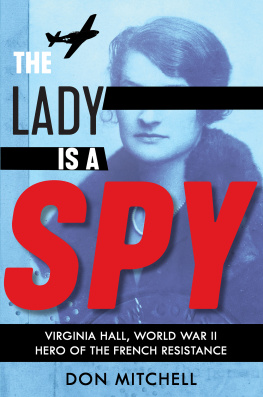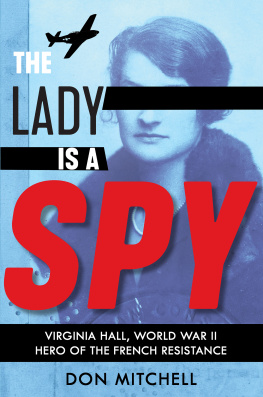About the Author
Stewart Alsop (19141974) was a longtime political columnist and commentator on American affairs. A graduate of Yale University, he worked in book publishing until World War II. Rejected by the US Army for medical reasons, he joined the British Army and fought with the Kings Royal Rifle Corps in Italy. He transferred to the US Army in 1944 to carry out missions planned by the Office of Strategic Services (OSS)the topic of his book Sub Rosa, written with OSS compatriot Thomas Braden. He was awarded the Croix de Guerre with palm for his work on wartime missions in France.
From 1945 to 1958, Stewart Alsop was cowriter, with his elder brother Joseph Alsop, of the thrice-weekly Matter of Fact column for the New York Herald Tribune. He went on to become the Washington editor of the Saturday Evening Post and wrote a weekly column for Newsweek from 1968 until his death in 1974. His final book, Stay of Execution, traces the yearshis lastafter his diagnosis with a rare form of leukemia.
Thomas Braden (19172009) was an American journalist best remembered as cohost of the CNN show Crossfire and as the author of Eight Is Enough, which became a popular television program. A graduate of Dartmouth College, he joined the British Army and fought with the Kings Royal Rifle Corps. He was later recruited by the US Office of Strategic Services (OSS), the World War II predecessor to the Central Intelligence Agency, and parachuted behind enemy lines into Nazi-occupied France. He and his OSS paratrooper compatriot Stewart Alsop published the book Sub Rosa about their experiences.
Braden joined the Central Intelligence Agency upon its inception and in 1950 became head of the International Organizations Division (IOD) of the CIAs Office of Policy Coordination, the covert action arm of agency secret operations. He left in 1954 to become a newspaper owner in California, later returning to Washington as a newspaper columnist. He also became a prominent political commentator on radio and television.

EARLY BIRD BOOKS
FRESH EBOOK DEALS, DELIVERED DAILY
BE THE FIRST TO KNOW
NEW DEALS HATCH EVERY DAY!


EARLY BIRD BOOKS
FRESH EBOOK DEALS, DELIVERED DAILY
BE THE FIRST TO KNOW
NEW DEALS HATCH EVERY DAY!

BILLY: THE SEAL MISSION
The word spy has a connotation of loneliness which frequently it does not deserve. In peacetime, most nations have the services of traveling businessmen who go about in foreign countries quite openly in search of customers and trade, and simply keep their eyes and ears open as they go. They are in fact spies, but their very stock in trade is their open congeniality.
In wartime, it is nearly always possible, as a later chapter will reveal, to get interesting facts about enemy countries by sending men into neutral countries. There is nothing lonely about the work of such men since they have a perfect right to be where they are, and can go about quite openly. Gregariousness for them is an admirable trait provided it is not accompanied by garrulousness.
In peace and in war, nations discover extremely important facts about each other by simply reading each others newspapers and other publications. Movements in population, births and deaths, shipping statistics and labor trends, can all be compiled by the expert who sits comfortably at home and who knows what to look for in the newspapers. If such men are indeed spies, they are not lonely.
There is in fact no type of intelligence operation in which the spy depends solely upon himself. The very word intelligence in its synonymous sense of information calls to mind at least two people, one to impart, and one to receive, and intelligence, as nations use the word, requires at least a third party, the one who uses it.
But there is one type of intelligence operation which depends more heavily than any other upon the lone and secret agent. It is used in wartime, not only because it is one of the few types of operations which has a chance of success in wartime, but because a time of war is the only time when it is necessary to use it. It was used by both Germany and the Allies during the last war, and for the Allies at least, it was a highly successful type of intelligence operation. It consists of sending men alone into enemy territory. Naturally, they are given the names of certain friends with whom they can establish relations and seek shelter, but insofar as the word spy connotes the lonely, these men are lonely.
Such a one-man operation was the Seal Mission, and such a spy was Billy. His is a typical story. It is also a true story. If it sounds fictional, that is typical too.
In the month of November, 1944, the country of Holland was a sea of hopelessness. To the south, British, Canadian, and Polish troops, pushing north past Eindhoven, had bogged down in mud and overflowing dikes. To the west, the Germans had blown the walls which let in the sea. British troops fought knee-deep in water.
To the north, there was mud and water too. Worse, there was famine. German soldiers, all but cut off from supply by the American push to the east, fighting bitterly in a last kind of trench warfare, knew by that time that their purpose in life was to stand and die. They took what food they could find from the Dutch. There seemed no longer any sense in paying.
The resistance movement in Holland had slowed to a standstill. In the occupied part of the country, packed deep with German troops, an uprising was out of the question. The nighttime vigils for the parachute supplies from England were likely to be interrupted disastrously at any moment by German troops on the move. Moreover, the resistance had been twice betrayed by a man they had accepted as their own.
He was called Bill of the Seamans House and had once been a British agent, under another name, Bill Overveen. He had turned. Now he traveled from one locality to another, met the local farmers, and pretended to be an Allied courier from England. When the farmers had eagerly introduced him and taken him into their plans, he would suddenly disappear. A day later, everyone who had confided in him would be arrested. It was disheartening to the point of despair.
The Dutch people, even those who took no active part in the resistance, were almost hopeless too. The work of industrious centuries spent in building, out the sea had been destroyed. Many of the fields lay flooded. The Allies were never coming. All was dirt, water, and mud.
Into that dismal bog, at 11:30 oclock on the night of November 10, a man dropped alone from the hole of a Liberator aircraft, into a ditch a half mile north of Ulrum. His was the Seal Mission, and he was known to the friends he left behind him as Billy.
What it was that impelled Billy alone into the land of the enemy that night was not immediately apparent to the men who flew him there. To the pilot of the Liberator who asked about him afterwards, to the other members of the crew, and to all his casual friends in England, Billy was a gregarious, congenial fellow, 27 years old, blond, good-looking except for that faint trace of coldness in the eyes which so often stamped the men whom OSS hired as agents.
Next page
